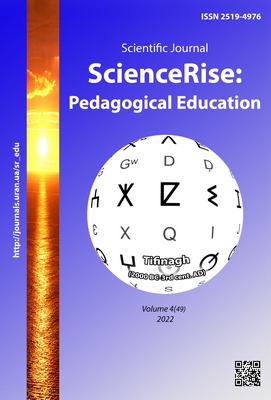Wikinomics in the higher education: the need to use tools and instruments
DOI:
https://doi.org/10.15587/2519-4984.2022.259205Keywords:
wikinomics, higher education, educational courses, online platforms, peering, informal education, non-formal educationAbstract
The article is devoted to the possibility of using the latest management models in modern higher education. A new economic model based on the use of information technology is analyzed - this model is called "Wikinomics".
Herein the essence of this model is determined - namely, peering, i.e. cooperation of equals, as the basis for the existence of the whole wikinomistic paradigm. The following key principles of wikinomics: openness, exchange of ideas, equality and globality are studied, as well as their content is adapted for use in the provision of higher education services.
In the article the possibility of using the tools of modern management models in higher education, namely wikinomics, is analyzed. The mechanism of functioning of online platforms of the educational courses is considered, and their compliance with the existing requirements of higher education is determined. The possibility of standardizing the use of wikinomistic approaches in higher education through non-formal and informal education is studied. The essence of non-formal and informal education is considered and the thesis that wikinomics is a manifestation of informal education is proved. The importance of adhering to the wikinomistic principles in informal education is proved. The need for the existence of online educational platforms as a tool for building an individual educational trajectory is postulated.
It is argued, that educational courses that are located on the recognized online platforms can and should be considered as the full-fledged educational components of the educational programs.
Herein the necessity of using the principles and approaches of wikinomics in higher education as the guarantee of rapid response to the changing labor market requirements and as the effective tool for increasing the competitiveness of modern students is substantiated
References
- Tapscott, D., Williams, A. (2009). Wikinomics. How Mass Collaboration Changes Everything. BestBusinessBooks.
- Gliva, A. (2010). Nestrimnii postup «Vіkіnomіki». Available at: http://www.management.com.ua/review/rev305.html
- Kniazev, D. (2010). «Vikinomika» v kratkom izlozhenii. Available at: http://habrahabr.ru/blogs/books/92766/
- Lombardi, R. (2006). Znakomtes: «Vikinomika». Available at: http://www.osp.ru/cw/2006/07/376011/
- Shved, V. (2011). Vikinomika kak novaia vekha v upravlenii. Ekonomika Kryma, 1, 234–237.
- Shved, V. (2017). Teoriia kollektivnykh deistvii i vikinomika: analiz istoricheskoi transformatcii. Problemi ekonomіki, 1, 315–319.
- Shved, V. (2012). Vikinomika yak nova hlobalna stratehiia biznesu. Stratehyia ekonomycheskoho razvytyia stran v uslovyiakh hlobalyzatsyy, 1. Available at: http://confcontact.com/2012_02_17/2012_strategy1/58_Shved.htm
- Shved, V. (2018). Vykorystannia instrumentiv povedinkovoi ekonomiky v osvitnii diialnosti. Zbirnyk naukovykh prats Khmelnytskoho instytutu sotsialnykh tekhnolohii Universytetu «Ukraina», 16, 18–22.
- Zhemchugov, A. (2014). Vikinomika kak biznes-model. Problemy teorii i praktiki upravleniia, 10, 121–125.
- Marchenko, O. S. (2015). Institutionalization of the new economy of mass collaboration: problems and foreign experience. Ekonomichna teoriia ta pravo, 3 (22), 55–66. Available at: http://econtlaw.nlu.edu.ua/wp-content/uploads/2015/11/%E2%84%96-3-55-66.pdf
- Zaiarna, V.S. (2015). Problema neformalnoi osvity ditei i molodi v YeS u konteksti doslidnytskykh tendentsii ukrainskoi pedahohichnoi nauky. Science and Education a New Dimension. –Pedagogy and Psychology, III (34 (69)), 49–32.
- Ivkina, O. (2012). Hromadianska osvita v shkolakh Ukrainy. Shcho tse? Available at: http://deti.zp.ua/show_article.php?a_id=506263
- Kaplan, A. M., Haenlein, M. (2016). Higher education and the digital revolution: About MOOCs, SPOCs, social media, and the Cookie Monster. Business Horizons, 59 (4), 441–450. doi: http://doi.org/10.1016/j.bushor.2016.03.008
- Ainsworth, H. L., Sarah, E. (2010). Formal, Non-Formal and Informal learningin the sciences. Onate Pres. Available at: http://w.eatonintl.com/www.eatonintl.com/Research_files/Formal,%20non-formal%20and%20informal%20learning%20in%20the%20sciences.pdf
- Rogers, А. (2004) Non-formal education: Flexible Schooling Or Participatory Education? Comparative Education Research Centre, 316. Available at: https://books.google.com.ua/books/about/Non_formal_education.html?id=H-ieAAAAMAAJ&redir_esc=y
- Roitblat, O. (2013) Razvytye neformalnoho obrazovanyia v sovremennom sotsyokulturnom prostranstve Rossyy. Chelovek y obrazovanye, 1, 25–28.
- Callanan, M., Cervantes, C., Loomis, M. (2011). Informal learning. Wiley Interdisciplinary Reviews: Cognitive Science, 2 (6), 646–655. doi: http://doi.org/10.1002/wcs.143
- Rogoff, B., Callanan, M., Gutiérrez, K. D., Erickson, F. (2016). The Organization of Informal Learning. Review of Research in Education, 40 (1), 356–401. doi: http://doi.org/10.3102/0091732x16680994
- Zhukevych, I. (2017). Informalna osvita yak faktor transformatsii suchasnoi osvity. Zbirnyk naukovykh prats Khersonskoho derzhavnoho universytetu. Pedahohichni nauky, 79 (1), 140–144.
- Bugaichuk, K. (2013). Formalnoe, neformalnoe i informalnoe distantcionnoe obuchenie: sushchnost, sootnoshenie, perspektivy. Available at: https://sites.google.com/site/relarn2010/glavnaa-stranica/tezisy-relarn-2013/bugajcuk-konstantin-formalnoe-neformalnoe-i-informalnoe-distancionnoe-obucenie-susnost-sootnosenie-perspektivy-1
- Shved, V., Medvedkin, R. (2018). Use of shering technologies in educational activity. Podilskyi naukovyi visnyk, 1, 112–115.
- Pro osvitu (2017). Zakon No. 2145-VIII. 05.09.2017. Available at: https://zakon.rada.gov.ua/laws/card/2145-19
- International Standard Classification of Education (2011). Available at: http://uis.unesco.org/sites/default/files/documents/international-standard-classification-of-education-isced-2011-en.pdf
- Richnyi zvit natsionalnoho ahentstva iz zabezpechennia yakosti vyshchoi osvity za 2021 rik. Available at: https://naqa.gov.ua/wp-content/uploads/2022/02/%D0%97%D0%B2%D1%96%D1%82-2021.pdf
Downloads
Published
How to Cite
Issue
Section
License
Copyright (c) 2022 Vadym Shved, Iryna Sarancha, Olena Omelchenko

This work is licensed under a Creative Commons Attribution 4.0 International License.
Our journal abides by the Creative Commons CC BY copyright rights and permissions for open access journals.
Authors, who are published in this journal, agree to the following conditions:
1. The authors reserve the right to authorship of the work and pass the first publication right of this work to the journal under the terms of a Creative Commons CC BY, which allows others to freely distribute the published research with the obligatory reference to the authors of the original work and the first publication of the work in this journal.
2. The authors have the right to conclude separate supplement agreements that relate to non-exclusive work distribution in the form in which it has been published by the journal (for example, to upload the work to the online storage of the journal or publish it as part of a monograph), provided that the reference to the first publication of the work in this journal is included.








